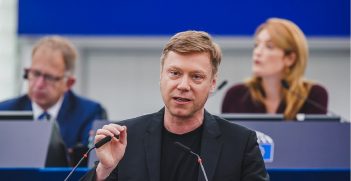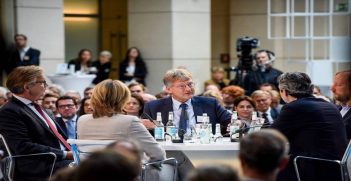An Ambitious Approach to the Australia-EU Free Trade Negotiations

With international trade tensions increasing, it is more important than ever to hasten efforts to achieve an Australia-EU free trade agreement.
Australia may not be the EU’s largest trade partner but make no mistake: the achievement of a free trade agreement (FTA) between Australia and the EU will send a powerful signal internationally about our combined commitment to cooperative approaches and rules-based international trade. Achieving a high-quality FTA would turn heads and put momentum back onto the agenda for liberalisation. It would also help reduce the impact of mutually increased tariffs between US and China.
Australia and the EU share a significant relationship. Collectively, the 28 states of the EU are Australia’s largest source of investment. The ‘EU-28’ is also Australia’s second largest goods and services trading partner. Even after Brexit, the EU will remain one of our most significant economic partners. The Business Council of Australia – which includes the largest companies in Australia, and many from the EU – wants to see the achievement of an ambitious, comprehensive and innovative agreement. We want to see lower barriers and a ‘stepchange’ in the ease of doing business between the EU and Australia.
Adopting a defensive approach, whereby both sides squeamishly anticipate points of political sensitivity and quarantine from the outcomes any area of potential resistance, won’t serve either side’s interests. We should not waste this opportunity by allowing negotiations to achieve only a narrow range of outcomes where there are ‘low hanging fruit’.
Rather, the two sides must signal a more generous approach that shows real leadership and vision – like the post-War European leaders Robert Schuman, the French Prime Minister, and his German counterpart Konrad Adenauer, who in the late 1940s and early 1950s worked together to put the animosities of World War II behind them and realise the European Coal and Steel Community, the forerunner of today’s common market and the EU. Their leadership rose above petty squabbling. Instead of tallying small national gains, they were willing to make substantial concessions to achieve the greater common good of European economic integration. I urge Australian and European leaders to work in this spirit in the negotiations between Australia and the EU.
There are many areas of likely demand by our European partners that are good for Australia, and which will boost the robustness and competitiveness of the Australian economy internationally. For example, we should also look to the possibilities of using European product standards. There is no better partner with whom to do this than the EU – it shares a likeminded approach with Australia on consumer protection and on social policy and health outcomes – so I hope that Australian policymakers will be prepared to explore how we could reduce duplication in regulating product standards by referencing equivalent European work.
There also needs to be a willingness to look at, and adjust, some of Australia’s outdated tariff and tax measures on automobiles, including the Luxury Car Tax, so that we can encourage the uptake of high-standard and low-emission vehicles.
And I would also welcome the FTA lifting screening thresholds for European investors in Australia, to the levels of those in Australia’s FTAs with the US, New Zealand and Chile (A$1.134 billion).
Just as Australia has much to gain from an ambitious and open approach, so too does Europe have much to gain and little to fear by opening its markets to Australia. We need to see improved access for Australian agricultural products and services in the European market. Australia will only ever supply a part of Europe’s consumer demand, but it will be an important additional source of supply and choice. We must always be focused on the fact that the ‘cake’ will grow, with opportunities for many different producers, if trade is liberal and markets are encouraged to expand.
The FTA promises much. I hope both sides take an expansive and ambitious approach, not a small-minded one. We can’t let this opportunity slip through our fingers.
Jennifer Westacott is Chief Executive of the Business Council of Australia and a member of the EU-Australia Leadership Forum Multi Stakeholder Steering Committee.
This article was originally published in The EU and Australia: Towards a New Era, the official publication of the EU-Australia Leadership Forum 2018, which took place from 18-22 November. It is republished with permission.
The AIIA is part of the international consortium selected to deliver the EU-Australia Leadership Forum project, a three-year initiative funded by the EU. Click here for video highlights of the forum.





